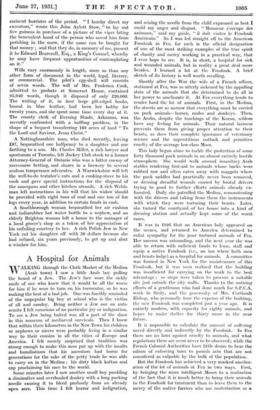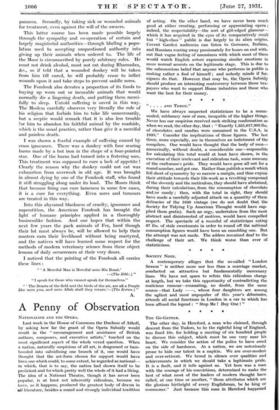A Hospital for Animals
WALKING through the Cloth Market of the Medina (Arab town) I saw a little Arab boy pulling the beard of a Jew. The Jew's face wore the sickly smile of one who knew that it would be all the worse for him if he were to turn on his tormentor, so he was making the best of a bad job. One was forcibly reminded of the unpopular big boy at school who is the victim of all and sundry. Being neither a Jew nor an anti- semite I felt conscious of no particular joy or indignation. To see a Jew being baited was all a part of the show in this museum of mediaeval survivals. Then I knew that within three kilometres in the New Town his children or nephews or nieces were probably living in a similar way to their cousins in all the cities of Europe and America. I felt merely surprised that tradition was strong enough to make this man put up with the insults and humiliations that his ancestors had borne for generations for the sake of the petty trade he was able to carry on in the Medina ; his dirty black kaftan and cap proclaiming his race to the world.
Some minutes later I saw another small boy prodding a diminutive and overloaded donkey with a long packing needle causing it to bleed profusely from an already open sore. This time I felt horror and indignation, and seizing the needle from the child expressed as best I could my anger and disgust. " Monsieur s'occupe des animaux," said my guide, " it doit visiter le Fondouk Americain." So I was led straight off to the American Fondouk in Fez, for such is the official designation of one of the most striking examples of the true spirit of charity and mercy working in a practical way, that I ever hope to see. It is, in short, a hospital for sick and wounded animals, but in reality a great deal more besides. I learned a lot at the Fondouk. A brief sketch of its history is well worth recalling.
Shortly after the War the wife of a French officer, stationed at Fez, was so utterly sickened by the appalling state of the animals that she determined to do all in her power to ameliorate it. At Fez everything tends to render hard the lot of animals. First, in the Medina, the streets are so narrow that everything must be carried on pack animals—horses, mules and donkeys. Then, the Arabs, despite the teachings of the Koran, seldom have any feeling for animals. Their natural laziness prevents them from giving proper attention to their beasts, as does their complete ignorance of veterinary science and the superstitious outlook and primitive cruelty of the average low-class Moor.
This lady began alone to tackle the protection of some forty thousand pack animals in an almost entirely hostile atmosphere. She would walk around insanitary Arab stables rendering first-aid to animals whose backs were rubbed raw and often eaten away with maggots where the pack saddles had practically never been removed, or dressing dreadful wounds caused by brutal drivers trying to goad to further efforts animals already ex- hausted. Daily she patrolled the Medina, remonstrating with the drivers and taking from them the instruments with which they were torturing their beasts. Later, she turned the courtyard of her house into a kind of dressing station and actually kept some of the worst cases.
It was in 1926 that an American lady appeared on the scenes, and returned to America determined to enlist sympathy for the poor tortured animals of Fez. Her success was astounding, and the next year she was able to return with sufficient funds to lease, staff and equip a native Fondouk (i.e., an inn where both men and beasts lodge) as a hospital for animals. A committee was formed in New York for the maintenance of this Fondouk, but it was soon realized that the building was insufficient for carrying on the work to the best advantage ; so steps were taken to procure a suitable site just outside the city walls. Thanks to the untiring efforts of a gentleman who had done much for S.P.C.A. work in Sicily, and the generosity of Mrs. Cortlandt Bishop, who personally bore the expense of the building, the new Fondouk was completed just a year ago. It is entirely modern, with capacity for eighty animals, and hopes to make shelter for thirty more in the near future.
It is impossible to calculate the amount of suffering saved directly and indirectly by the Fondouk. In Fez there are no laws against cruelty to animals, and what regulations there are seem never to be observed ; while the French Colonial Authorities have little desire to bear the odium of enforcing laws to punish acts that are not considered as culpable by the bulk of the population.
But the Fondouk has achieved a very marked amelior- ation of the lot of animals at Fez in two ways. First, by bringing the more intelligent Moors to a realization of the fact that it is much better to bring their animals to the Fondouk for treatment than to leave them to the mercy of the native farriers who use cauterization as a panacea. Secondly, by taking sick or wounded animals for treatment, even against the will of the owners.
This latter course has been made possible largely through the sympathy and co-operation of certain and largely magisterial authorities—through bluffing a popu- lation used to accepting unquestioned authoritir into giving up their animals when ordered to. The life of the Moor is circumscribed by purely arbitrary rules. He Must not drink alcohol, must not eat during Rhamadan, 4c., so if told that a wounded donkey will be taken from him till cured, he will probably cease to inflict wounds upon it and take steps to prevent saddle sores.
The Fondouk also devotes a proportion of its funds to buying up worn 'out or incurable animals that would normally die a lingering death, and putting them merci- fully to sleep. Untold suffering is saved in this way. The Moslem carefully observes very literally the rule of his religion that forbids him to take life unnecessarily, but a sceptic would remark that it is also less trouble for him to abandon his faithful animal by the roadside, which is the usual practice, rather than give it a merciful and painless death.
I was shown a fearful example of suffering caused by crass ignorance. There was a donkey -with four searing burns made 'by a hot iron in the shape of a four-pointed star. One of the burns had turned into a festering sore. This treatment was supposed to cure a lack of appetite ! Clearly the reason why the donkey could not eat was exhaustion from overwork in old, age. It was brought in almost dying by one of the Fondouk staff, who found it still struggling along under its load. The Moors think that because firing can cure lameness in some few cases, it is a cure for everything. Even sores and tumours are treated in this way.
Into this abyssmal blackness of cruelty, ignorance and superstition, the American Fondouk has brought the light of humane principles applied in a thoroughly businesslike fashion. And one hopes that within the next few years the pack animals of Fez, hard though their lot must always be, will be allowed to help their masters earn their livelihood without being martyred, and the natives will have learned some respect for the methods of modern veterinary science from these object lessons of daily occurrences at their very doors.
I noticed that the printing of the Fondouk all carries these lines : " A Merciful Man is Merciful unto His Beast.'
—(The Bible.)" "I speak for those who cannot speak for themselves."
" The Beasts of the field and the birds of the air, are all a People like unto you, and unto Allah shall they return.'—(The Koran.) '
A.







































 Previous page
Previous page